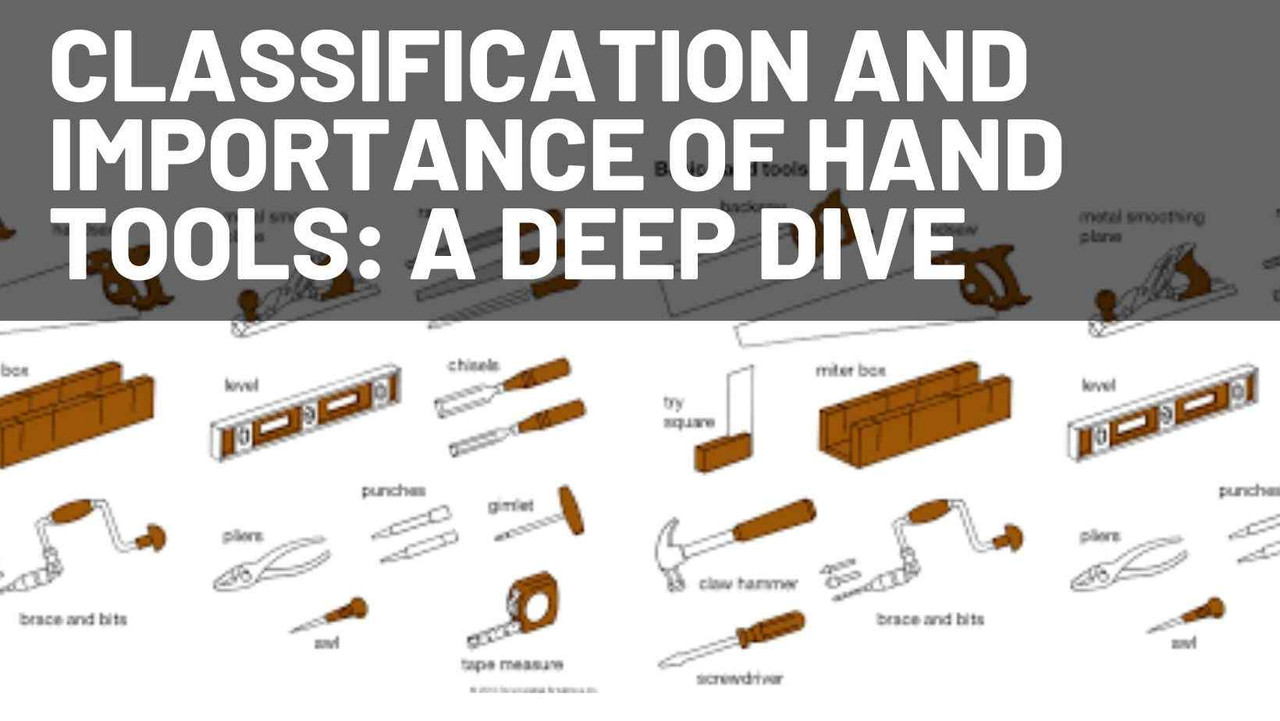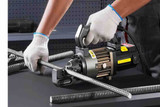Classification and Importance of Hand Tools: A Deep Dive
Classification and Importance of Hand Tools
Hand tools have remained an integral part of human civilization. From ancient civilizations using essential tools made of stones and bones to today's specialized tools made of advanced materials, hand tools have evolved tremendously. Let's dive deeply into the Classification and importance of these tools; this article also explains some frequent questions about such classifications which was not explicitly explained in our previous article on the importance and classification of hand tools
Categories of Hand Tools: From Basic to Specialized
Hand tools can be broadly classified into two categories: basic and specialized.
Basic Hand Tools: These tools have been around for ages and are commonly found in almost every household. Examples include:
- Hammers: Used for driving nails, breaking objects, and other similar tasks.
- Screwdrivers: Designed to turn screws with slotted, Phillips, Torx, or other types of heads.
- Pliers: Used for holding objects firmly, bending, or cutting.
Specialized Hand Tools: As industries and technologies advanced, there arose a need for more specialized tools to cater to specific tasks. Examples include:
- Torque Wrenches: Used in the automotive industry to apply a specific torque to a bolt or nut.
- Wire Strippers: Designed for stripping the electrical insulation from electric wires.
Read also
Choosing the Perfect Hand Tool: Key Factors to Consider for a Wise Purchase
Classification of Hand Tools According to Their Uses
Understanding the Classification of hand tools based on their use can be quite enlightening:
- Cutting Tools: These include scissors, hacksaws, and chisels. They are designed to cut through wood, metal, or fabric.
- Driving Tools: Tools like screwdrivers and wrenches fall into this category. They are used to drive nails, screws, or bolts.
- Gripping Tools: Pliers and wrenches grip, twist, hold, tighten, or loosen objects.
- Measuring Tools: Rulers, tape, and calipers are used to measure dimensions and sizes.
The Role of Hand Tools in Different Industries
From construction to electronics, hand tools have cemented their place in various industries:
- Construction Industry: Hand tools are the backbone. Construction sites are complete with these, whether it's a hammer, screwdriver, or measuring tape.
- Electronics Industry: Precision is key here. Specialized tools like wire strippers, soldering irons, and multimeters are essential.
- Automotive Industry: This industry relies heavily on tools like wrenches, pliers, and jacks to build and repair vehicles.
- Woodworking: Here, saws, chisels, and planes are crucial in shaping and crafting wood.
Why Quality Matters in Hand Tool Selection
Quality is paramount when selecting hand tools for several reasons:
- Durability: High-quality tools last longer, making them a better investment in the long run.
- Safety: Poor-quality tools can break or malfunction, posing risks to the user.
- Efficiency: Quality tools are often more efficient, ensuring tasks are completed more quickly and accurately.
- Reliability: For professionals, having reliable tools is essential. Quality tools ensure consistent performance, ensuring tasks are done right the first time.
How to Choose the Right Tool for the Job Based on Its Classification
Selecting the right tool involves understanding the task at hand and the tool's Classification:
- Understand the Task: Clearly define what needs to be done. Are you cutting, measuring, or driving?
- Refer to the Tool's Classification: Once the task is straightforward, refer to the classifications. If you're cutting metal, you'd choose a hacksaw (a cutting tool) over a hammer (a driving tool).
- Consider Specialization: Ensure the tool is designed specifically for tasks requiring precision or specialization. For example, for electrical jobs, opt for insulated screwdrivers.
In conclusion, hand tools have evolved alongside human civilization, growing in diversity and specialization. Their Classification is an academic exercise and a practical guide to ensure we choose the right tool for the task, ensuring efficiency, safety, and reliability. Whether you're a DIY enthusiast or a professional, understanding the importance and Classification of hand tools is the foundation of any successful project.
Looking for top-tier hand tools tailored to your needs? Don't leave your projects to chance. Trust the experts at Tend Industrial Supplies for unparalleled quality and guidance. Reach out now at sales@tendsupplies.com or dive deep into our comprehensive range by visiting tendsupplies.com. Your next best tool is just a click away!"
FAQs on Classification of Hand Tools
1. Q: What distinguishes basic hand tools from specialized hand tools?
A: Basic hand tools are commonly found in most households and are used for a wide range of general tasks, like hammers and screwdrivers. In contrast, specialized hand tools cater to specific tasks in particular industries, such as torque wrenches in the automotive sector or wire strippers in electronics.
2. Q: Why are there so many classifications for hand tools?
A: Hand tools are classified according to their primary functions to make it easier for users to select the right tool for a specific task. This organization ensures efficiency and safety while working.
3. Q: In which industry is precision most critical regarding hand tools?
A: Precision is crucial in many industries, but in the electronics industry, it's especially vital. This sector often requires specialized tools like wire strippers and soldering irons to work on minute and intricate components.
4. Q: Why should I invest in high-quality hand tools when cheaper alternatives are available?
A: Investing in high-quality hand tools offers benefits like durability, safety, efficiency, and reliability. While cheaper alternatives seem cost-effective initially, they can wear out faster and may not perform tasks as effectively or safely.
5. Q: How can I determine if a hand tool is high quality?
A: Quality in hand tools can often be determined by factors like the materials used, the brand reputation, user reviews, and warranty offered. The tool's weight, finish, and ergonomics can also hint at its quality.
6. Q: Are there universal hand tools that can perform multiple tasks, reducing the need for specialized tools?
A: Some hand tools are designed to be multi-functional, like multi-bit screwdrivers or adjustable wrenches. While these are convenient for general tasks, specialized tasks require specific tools for optimal results.
7. Q: How frequently should I maintain or check my hand tools for wear and tear?
A: The frequency of maintenance largely depends on usage. Regular tools should be checked after every use, while those used less frequently can be inspected monthly. Always ensure clean, sharp, and rust-free tools for maximum efficiency and safety.
8. Q: What's the best way to store hand tools to ensure they last long?
A: Store hand tools in a cool, dry place. Using toolboxes, pegboards, or racks can help organize them. It's essential to keep them away from moisture to prevent rust and to ensure they're cleaned and dried before storage.
Readers like










